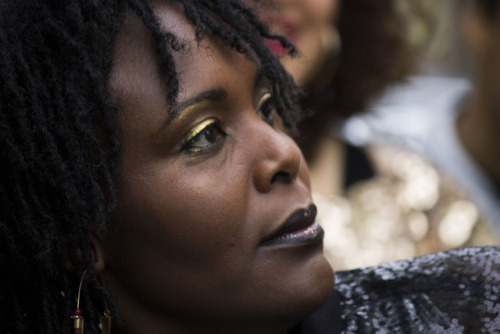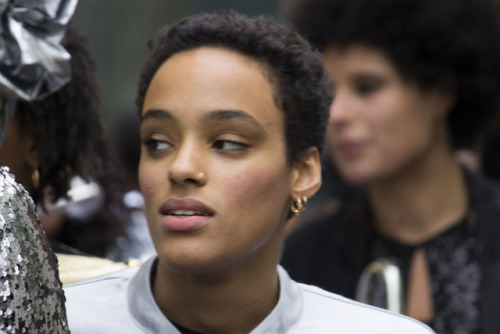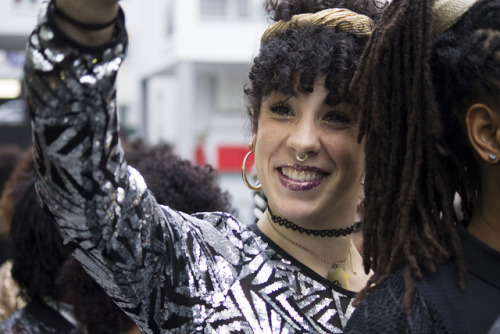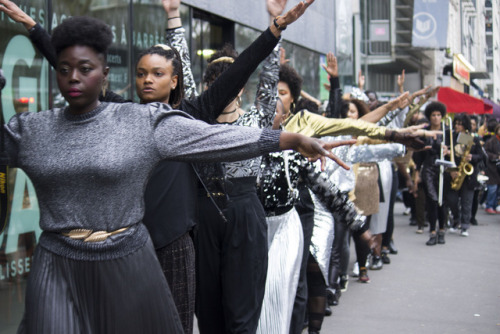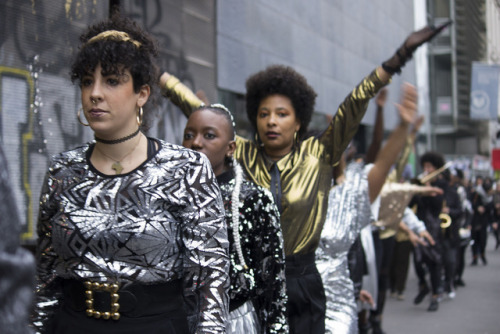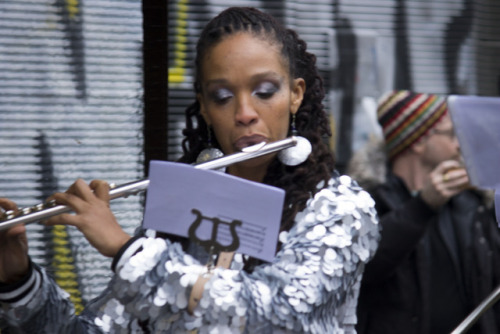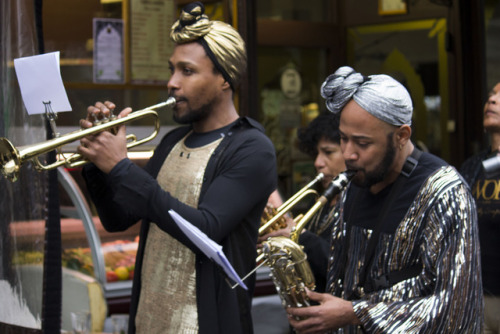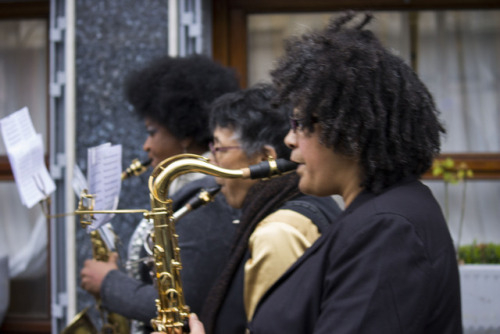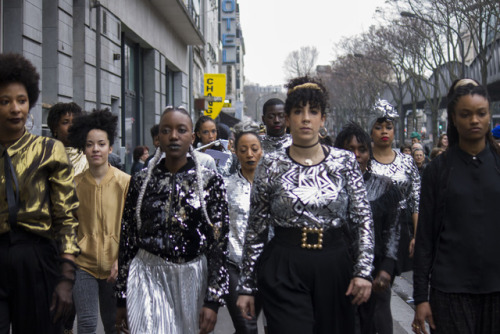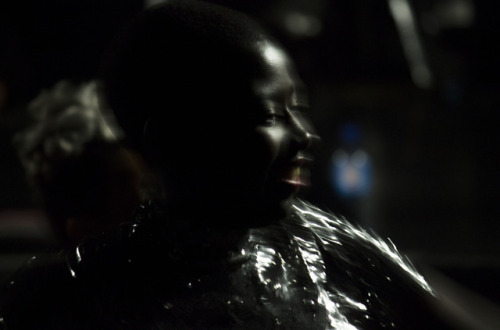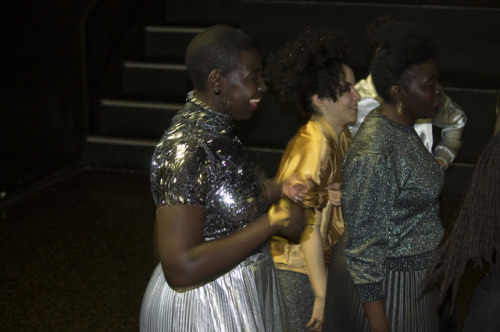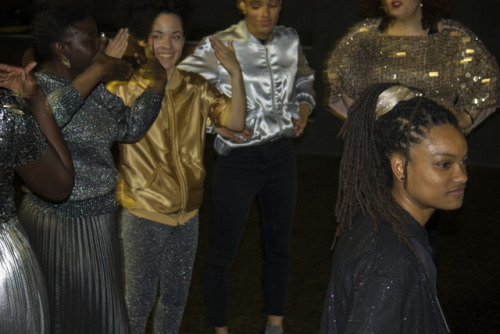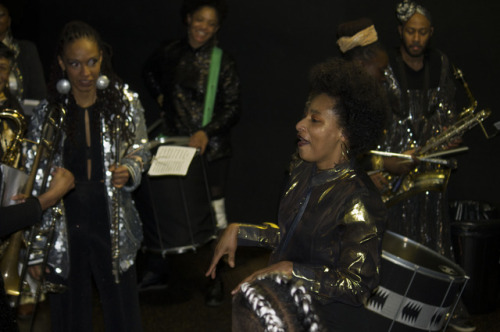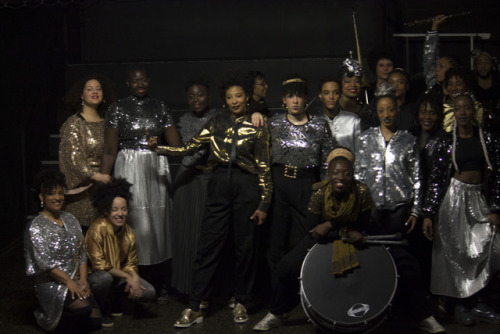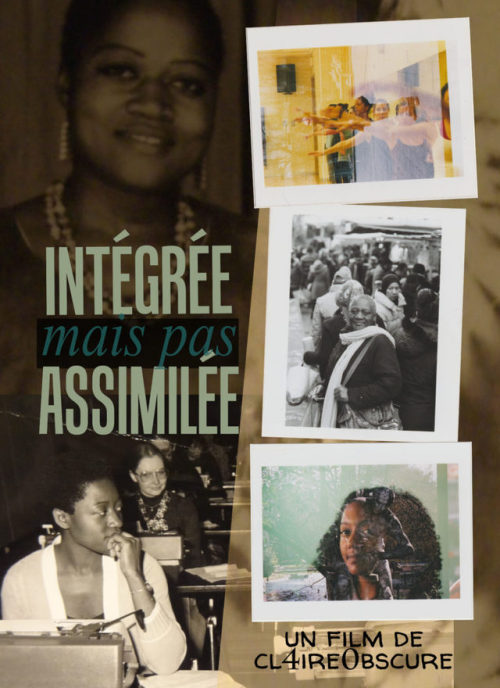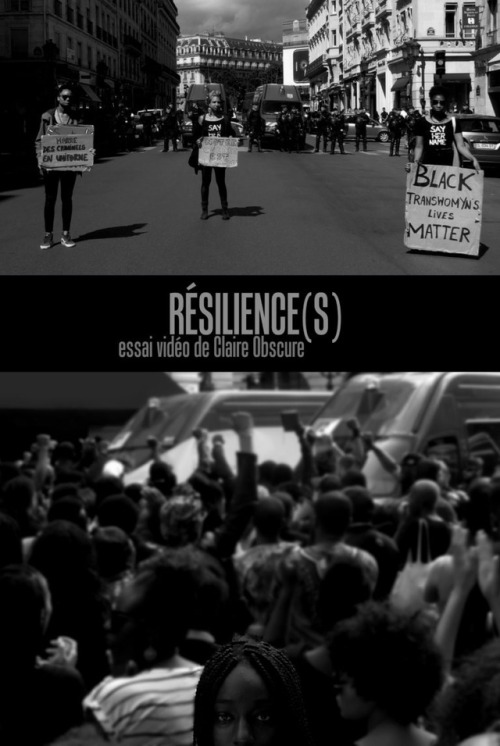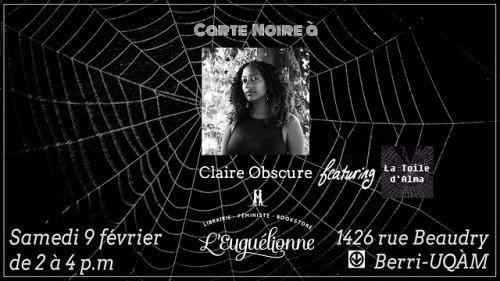#afrofeminisme
“Ugh I didn’t like France. French people are racist”“Go to Italy! They’re so friendly and I hear they love black women”“Do Germans even have black people outside of the military?”
It’s something almost every black traveller fathoms before venturing abroad. How will my blackness be perceived in this predominantly non-black space? It’s a valid concern. At best, our otherness might put us on a flattering pedestal. At worst, we might get mistreated. Even traveling to remote areas of the U.S you will find people that stare at you and ask aggravating questions like “Can I touch your hair?”. I certainly wondered about how I’d fare as a black woman before moving to France.

But this post is really not justabout me. Yes I am black. Yes I am in Europe. But that really doesn’t make me special. Because even though only a small percentage of African Americans travel to Europe yearly, there are tens of millions of black people that are already there: Afro-Europeans.
Black people don’t just live in Africa and the United States. Thanks (but like, no thanks) to colonialism, the African diaspora truly reaches some of the most unlikely corners of the earth. Most African Americans make the mistake of assuming that we are the only group of african descendants living as the underrepresented, mistreated, systematically oppressed minorities in predominantly white spaces. Tell that to the 55 million Afro-Brazilians. Or the millions of black descendants in the UK, Italy, and France.
But our egocentricism isn’t entirely our fault. I, too, had no idea exactly how many black and brown people lived in Europe until I came here. I assumed based on films, television, and images I had seen growing up that Europe is one homogenous white continent. Full of sameness with very little variation of color or culture (or at least not culture from an ethnic standpoint). It’s the invisible diversity of Europe. In the same way African-Americans lack representation in almost all facets of our society, Afro-Europeans lack it even more.

I had met a lot of people my first couple of months in France but I still felt something was missing. I yearned to connect with people that were like-minded. People in which I had an inevitable bond with. In short, I needed to make black friends. It sounds silly to some but anyone a part of a minority group in some way (race, sexuality, etc) understands this desire.
The problem was never the lack of black people, but how to organically make friends with them. Making friends as an adult is not an easy feat. When you’re a kid it’s so easy! All you have to do is say this:
But how do you tell a random person you think they’re kinda cool and we should hang out in the most platonic way possible without being creepy?
Several months later and I’ve met friends of friends, connected with random people through social media, and have even joined a Black Expats in Paris meet-up. By speaking with people I’ve gathered quite a few perspectives.
African Americans are both admired and envied in France. Believe it or not, we have the type of global visibility not afforded to others of the African Diaspora. African Americans are the examples of cool, the creators of pop culture. Our celebrities are their celebrities, our favorite TV shows are their favorites too. African Americans are vocal in periods of inequality and reactionary during times of social injustice. Mike Brown & Trayvon Martin are not only names uttered on American soil. “I Have a Dream” is familiar to all European ears, the “Black Lives Matter” cry has been heard around world and the Civil Rights Movement is a part of their curriculum just as much as ours. In short, the Black American experience has left a definite mark in world history.
For Black Europeans, however, their history tends to get shoved under the rug. I am not AT ALL an expert on this topic but here is a concise history of European colonization in Africa in my own words.
**Anndi’s Quick and Over-simplified History on the Conquest of Africa**
In the late 1800s, several European countries such as the UK, France, and Portugal had set up port cities in Africa for trading goods and resources. Everything was cool until this dude named King Leopold II of Belgium was like, “you know what would be awesome? My own territory in the Congo”. So homeboy sliced out a chunk of the Congo for his own PERSONAL benefit, not even in the name of Belgium. The other European powers (UK, France, Italy, Portugal, and Germany) started to freak out and thought, “Damn my ego is super big, how can I make it bigger?”. So they had a meeting in Germany, found a map of Africa, and literally cut the continent apart like slices of pizza. It’s worth mentioning that none of the African countries in question were invited to said pizza party. So NINETY PERCENT of the continent was colonized without permission,MILLIONSof Africans were forced into labor, resources were exploited, men were killed, women were raped, children were maimed, feuding ethnic groups were mixed…all under the guise that they were “saving uncivilized savages from eternal damnation”.
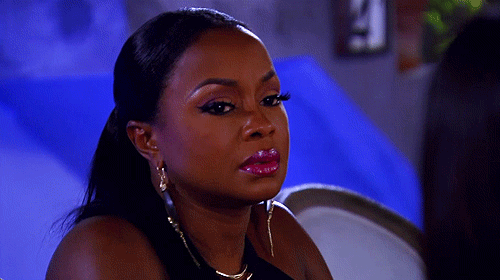
Flash forward several decades and the European Powers finally started to leave. Whether they left on their own accord or were driven out by revolutionary groups, the heinous effects of imperialism are evident for several African countries by way of corrupt governments, tireless civil wars, and psychological trauma.
**The End** ….Except not the end because these heinous effects still linger.
I’ve noticed a slight lack in community for Afro-French people. For African-Americans, there’s this idea of fictive kinship. I may not know you from Adam, but if we are the only two black people within a predominantly white space then we will acknowledge one another. But that’s only on a micro-level. On a macro-scale, we have become masters of creating spaces for ourselves. Hair salons & barbershops, Historically Black Colleges and Universities, BET Network, NAACP… we have a black national anthem!! All with the intent of uplifting and strengthening one another, for validating our place in a society not made for us.
But our sense of community derives from our shared experiences. Many of our ancestors were slaves. Many of our living relatives grew up in segregation. For France, and many other European countries, the experiences of black europeans, while similar, are not identical nor are they shared. At any rate, its hard to have a sense of community when you don’t even know how many people of African descent live in your country. Apparently, taking an ethnic census is constitutionally banned in France.
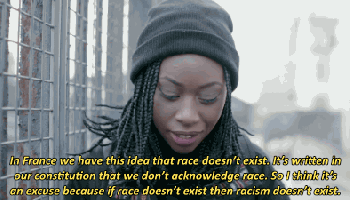
For Afro-french people, they’re not bound together by race as much as their family origins. If you’re a black woman from Guadeloupe, you might feel a bigger bond to people from the West Indies than to those from West Africa. Honestly, I envy greatly that Afro-Europeans know exactly where they come from and even have family that still live in those countries. I have never felt so shameful about not knowing my roots until moving here. Every time I meet an Afro-french person for the first time, the conversation goes as follows.
Them:So where are you from?
Me:I’m from the U.S!
Them:Yeah, I know. But like where are you really from?
Me: Washington, DC.
Them:What’s your family origin I mean to say.
Me:Um…I don’t know? My ancestors were slaves so…
Them:…..
Me:…..Nice meeting you!
In general, there’s this idea that black people are never really from whatever predominantly white country they reside in. Afro-french people can be born and raised in Paris and never feel or be seen as “french”. Even when I meet White Europeans, they are generally skeptical about my origin story but for a different reason. Because I have a lighter skin tone than most Afro-french, many assume that I am “métisse” or mixed. During my trip to Italy, an italian man told me “You’re beautiful. I love mulattowomen”. The assumption really bothers me because black and beautiful are not mutually exclusive concepts homeboy! But I do love their faces of disappointment when I tell them I am proudly, undeniably, 100% BLACK.
But let’s discuss some positives, for there are many. While Black French don’t organize against injustices in the same way we do, that doesn’t mean they aren’t having these important conversations. The Afro-fem movement seems to be really big here. I’ve seen countless articles, youtube videos, tweets, and have even been invited to conferences by Afro-feminists to discuss the interesting balance of race and gender.
I’ve met so many black french women who are smart and woke. Clever and funny. Women who want to be a voice for their community. Women who are artists, poets, and singers. Women who are beautiful inside and out. Women who are writers. Women who are fly. Women who are college educated. Women who want to uplift and strengthen their fellow sisters. Women who want to be a vessel for serious change in their society.

So don’t sleep on Afro-Europeans. They have a very real place in our world.
I would be remiss not to mention the Strolling Series by Cecile Emeke, which was in truth my personal introduction to Afro-European voices. Cecile Emeke is a British woman who brilliantly decided to film black individuals across the African diaspora. The result? Unraveling the generalized blanket of our black experiences into singular, personal threads of testimony. Emeke has filmed in the Netherlands, Italy, Jamaica, and many other countries and its widespread appeal has garnered a huge Youtube following. Of course, you’ll hear the familiar stories of micro-agressions, respectability politics, and self-love affirmation. But you’ll also hear views on mental health, sexual orientation & expression, capitalism, veganism, colonial reparations, and a plethora of other subjects not often heard from black standpoints.
If you’re interested, I would start with one of my three favorites: Two Black Friends in France ,One Black Male Feminist from the UK, orA Black Actress in London.
So what does it mean to be Black in Europe? I have the same answer for someone who would ask what its like to be black in the U.S. There is no simple answer. The culture, the attitudes, the ideas, the joys, the struggles of black people are not monolithic. They are varied. They are nuanced. They may intersect but they don’t coalesce.
I write this to say there is more to the black experience than what you have experienced personally. I think its important not only to have conversations on blackness within the US but in a global context as well. And lets remind ourselves that as Black Americans, our global visibility gives us a certain level of privilege. The next time you say #BlackLivesMatter, mentally expand that demand outside of North America. When you think of the black community, challenge yourself to think beyond your own borders.
And if you’re able, travel abroad. Talk to people. Have these discussions. Your eyes and minds will open wider than you know.

30 nuances de noir-es / Black French Feminist Marching Band
Part 2/4 (REJOICE)
March 2017 / Barbès / Paris
https://www.facebook.com/30nuancesdenoires/
photos & video
Post link
30 nuances de noir-es / Black French feminist Marching Band
Part 1/4 (behind the curtains)
March 2017 / Barbès / Paris
Post link
Carte Noire à Claire Obscure feat. La Toile d’Alma
It was a pleasure to share my earliest video works with you last weekend. A lot has happened since this shy yet ambitious beginning. Many lessons learned, they confirm my intentions, bring nuances to them and a hint of wisdom, at least I hope.
Since I moved to Montreal, I unfortunately dedicate less time to video but this practice is here to stay in my artivist arsenal. Its vocabulary comes almost organically to me since I have spent a couple of decades in front of the small screen, in movie theatres and today online.
The desire and urgency of documenting is still here, yet it is a much more reflective work than it used to be. This year, I intend to design a multidisciplinary artistic grammar and perfect it. A practice that will fulfill my esthetical expectations as well as my political worldview. I plan to keep working on its hybridation towards a shape that will bring meaning and honor to my vision.
Ce fut un vrai plaisir de partager avec vous mes deux premiers travaux vidéos Intégrée Mais Pas AssimiléeetRésilience(s). Nous avons également écouté un extrait des entrevues enregistrées à la fin du Camp d’Été Décolonialet un mini-reportage sur le festival afroféministe Nyansapo.
Beaucoup de chemin parcouru depuis ces débuts timides et pourtant ambitieux. Les leçons de vie apprises, tantôt douces, tantôt dures, ne font que confirmer mes intentions, elles y apportent des nuances, et je l’espère un peu de sagesse.
Je consacre bien moins de temps au travail vidéo depuis mon arrivée à Montréal, mais cette pratique dans mon arsenal d’artiviste dans la mesure ou son vocabulaire me vient de façon assez organique, ce qui est du aux décennies passées devant le petit écran, dans les salles noires, et aujourd’hui en ligne.
Le désir et l’urgence de documenter m’accompagnent toujours, et cette année, je souhaite développer une grammaire artistique multidisciplinaire à mon image, la perfectionner. Une pratique qui remplira mes exigences aussi bien techniques qu’esthétiques.
La formation en autodidacte occupe une place prépondérante dans mon parcours, en particulier pour les arts numériques. J’ai aujourd’hui le privilège de pouvoir me repencher sur des aspects plus plastiques de ma pratique et de travailler à son hybridation progressive vers une forme qui fait sens et honneur à ma vision.
Je remercie toutes les personnes qui se sont déplacées pour venir m’écouter et me rencontrer, et toutes celles qui me soutiennent de près comme de loin. Merci à ma mère sans qui je n’aurais pas osé faire ce premier court, et à mes sista/o dont le courage et la beauté d’âme m’ont commandé de les capturer en vidéo.
Enfin, merci à l’équipe de l’Euguélionne, mes suricates bibliophiles préféré.e.s Québec!
Post link
Pour le Mois de l'Histoire des NoirEs, l'Euguélionnepropose une programmation qui fait la part belle aux voix de femmes noires et afrodescendantes. Les rencontres Carte Noire donnent la parole à Josiane Ménard et Claire Obscure. L'autrice et l'artiviste prennent la plume et la caméra pour écrire leurs propres histoires et viendront nous parler de leurs intentions et de leurs processus créatifs dans un cadre convivial et détendu.
Claire Obscure est née en France et vit à Montréal depuis un an. Elle s'interroge depuis l'adolescence sur la représentation des minorités et sur celles et ceux qui écrivent l'Histoire.
Depuis 2014, ses engagements afroféministes lui ont apporté des éléments de réponse. En commençant à produire des vidéos pour La Toile d'Alma et à documenter les activités communautaires auxquelles elle prenait part, de nouvelles questions émergent.
D'après elle, la multidisciplinarité de sa pratique artistique est un moyen d'y répondre. Figurer l'hybridité de son identité noire, féminine, métisse, francilienne, militante, artistique, humaine…
Aux identités binaires ou morcelées, CL4IRE0BSCURE répond par une vision nuancée et composite et se définit désormais comme artiviste.
Cette Carte Noire est l'occasion de découvrir son travail et d'échanger avec elle sur les enjeux politiques, esthétiques et existentiels qui l'habitent.
PROJECTIONS:
Intégrée mais pas assimilée (2016, 16’)
Résilience(s) (2017, 20’)
http://cl4ire0bscure.com/
https://latoiledalma.wordpress.com/
Post link


